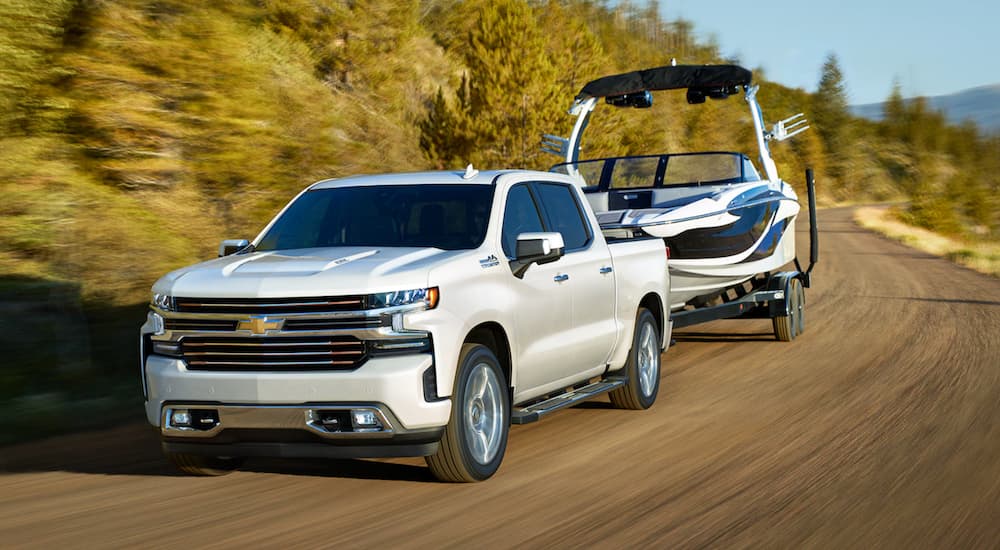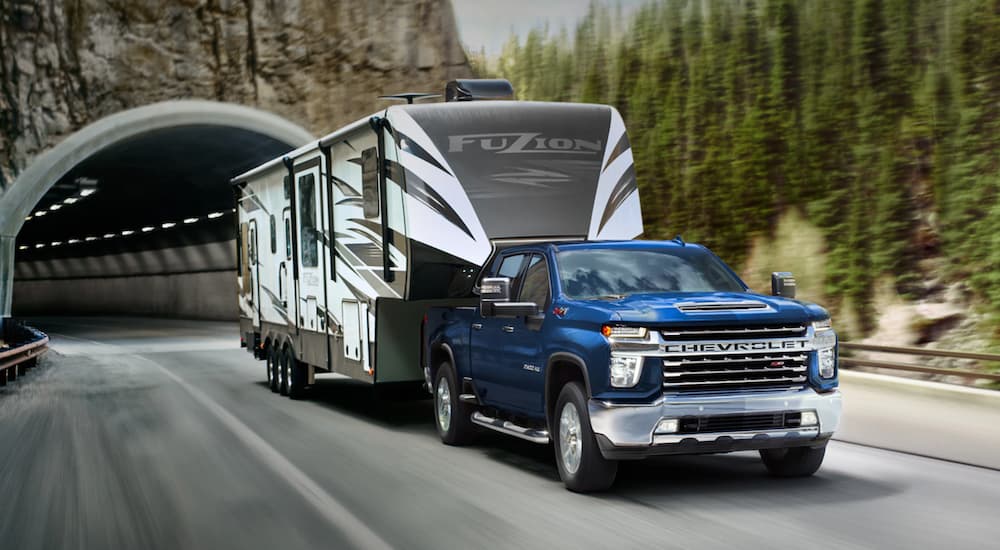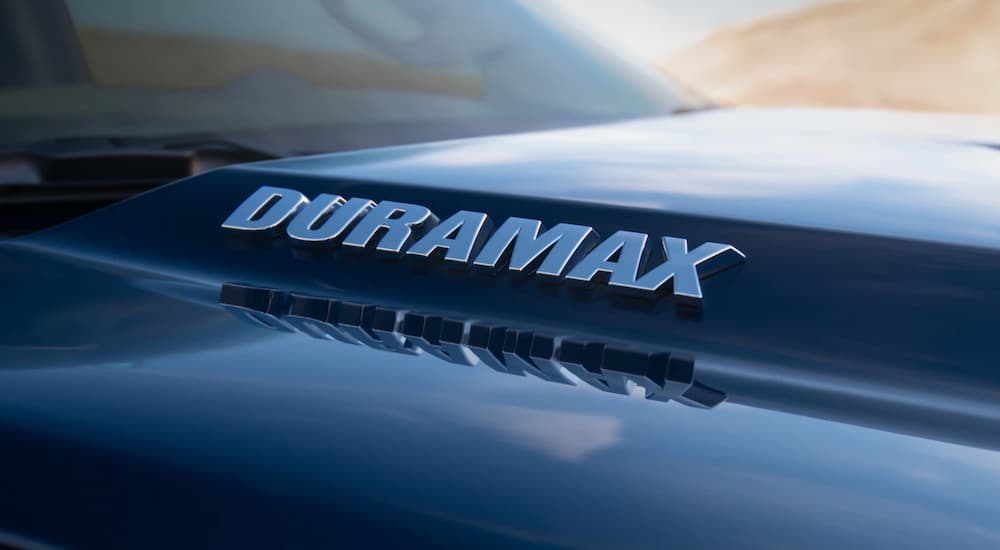
Before purchasing a new or used pickup truck, it’s not uncommon for truck shoppers to sift through a litany of questions related to the pickup they plan on purchasing, whether it’s about seating arrangements, luxury options, packages, trims, or the powertrain. If you were eyeing Chevy trucks in particular and were looking to purchase a pickup but wanted more information related to fuel economy and powertrain types, one of the more common questions that shoppers might ask is: does the Chevy Silverado have a diesel option? The answer is yes. The Chevy Silverado does have a diesel engine option.
Keep in mind that most base trim Silverados come with gasoline-powered fuel injection or Ecotec engines that are more eco-friendly standard. However, for truck shoppers who prefer diesel for various reasons, the option is there for every generation of the Silverado, even though the options are rather slim, and the configurations are quite limited.
What Sort Of Diesel Engine Does the Chevy Silverado Have?
The first diesel engine used in a Chevy Silverado was a 6.6-liter Duramax V8 that was made available in the Heavy Duty 2500 variant of the Silverado during the early first-generation run of the pickup in 2000. The second generation of the Silverado saw the return of the 6.6-liter Duramax V8 for the 2500 and 3500 Heavy Duty series, while the third and fourth generation featured two variants of the Duramax for the Heavy Duty class, with the LML Duramax V8 outputting 397 horsepower and 765 lb-ft of torque, while the L5P Duramax V8 produced a whopping 445 horsepower and 910 lb-ft of torque.
For the first time in the pickup’s lifespan, the fourth generation Silverado 1500 series was given a diesel option on specific trims with the 3.0-liter Duramax I6. For reference, the nearest gasoline-based engine of the Chevy Silverado 1500, the 2.7-liter I4, has a fuel economy rating of 19 MPG on the street and 22 MPG on the highway, whereas the 3.0-liter Duramax I6 manages a fuel economy of 23 MPG in the city and up to 33 MPG on the highway. So, no matter which generation of Silverado you may be thinking about purchasing, every generation has a diesel option.

What’s The Difference Between Diesel And Gasoline Engines?
Now that you know that certain trims of the Silverado come with a diesel engine, the next common question is: what’s the difference between a diesel and a gasoline engine? Well, both gasoline and diesel engines rely on internal combustion to generate the energy needed to propel the vehicle. However, diesel fuel and gasoline have rather different properties and the engines have to be designed to account for those differences.
Gasoline is a lighter fuel that must be properly mixed with air before being ignited with a spark. This means that gasoline engines require spark plugs as well as a way to mix fuel – in the old days that meant carburetors, but today it means computer-controlled fuel injectors. In contrast, diesel fuel is heavier and can be safely ignited with compression alone. This means that there are no spark plugs and the fuel is simply injected into the cylinders and squeezed until it ignites.
These differences in how the two engine types function also result in rather different performance. With a gasoline engine you will generally have a high redline with lots of horsepower but not much torque, which is great for driving fast. On the other hand, a diesel engine will have a low redline and not much horsepower but plenty of torque, which is great for towing and hauling. Diesel engines also burn significantly less fuel than gasoline engines because there is more energy in a gallon of diesel fuel than in a gallon of gasoline.
What’s The Benefit and Downside Of Diesel?
A lot of times, people assume that traditional petroleum gasoline is the best kind of fuel to use, but most shipping, cargo, and trucking companies rely on diesel because it offers better dollar-to-mileage than gasoline. So, if you’re making long hauls, need to freight large amounts of cargo from one place to the next, or are frequently traveling on the road, diesel definitely seems like the most cost-effective option when compared to gasoline.
The other benefit of diesel engines is that they can use biodiesel as a fuel option. Biodiesel is made from food oils or animal fats and concentrated to burn like traditional fuel. Biodiesel can also be combined with standard diesel fuel. You may have heard of some people using fatty oils from cooked foods in their diesel cars. This is also an option that is available for some engines; however, not every diesel engine can run on food oils alone.
The other downside is that diesel engines are known for being louder than gas-powered engines, as well as producing more soot and grime than their combustion-based cousin. This is because despite having fewer carbon emissions, older diesel engines can generate a lot of other harmful matter, different from the kind produced by gas-powered engines.
Many of the downsides of diesel engines – including soot, noise, and size – have been or are being addressed with newer generations of diesel-powered production cars and trucks. Even with the advancements, consumer cars and trucks with diesel engines are still far and few between the many gas-powered vehicles on the road.

Should I Buy A Silverado With A Diesel?
Whether or not you should buy diesel all depends on what you plan to use your diesel-powered Silverado for. If you’re simply into Chevy trucks and want a diesel option just to have one, then why not? Go for it. If you’re into hauling or towing a lot of loads, cargo, equipment, or supplies using a production pickup truck, then it also makes sense to go with diesel. Remember, a diesel engine is great for long hauls and saving on fuel economy. If you do a lot of highway driving and plenty of trips out of town while on the road, then diesel certainly looks mighty appetizing for your wallet.
Alternatively, if you spend most of your time in the city and find yourself doing a lot of basic errands or stop-and-go driving, then the more street-friendly Ecotec option might be a better bet. On the upside, if you were looking at a fourth generation Silverado, the added benefit of the 3.0-liter Duramax engine is that it’s much quieter and more emission-compliant than previous diesel engines, making it practically indistinguishable to gasoline engines from a comfort/convenience perspective.
Additionally, if you were worried about the Silverado’s diesel engine producing a lot of smog or soot, sullying up your driveway, or dirtying the exterior of the car, GM has gone the extra mile in making the newer generation of Duramax engines much more eco-friendly than past iterations, drastically reducing emissions. So not only are newer generation diesel engines much quieter than their louder predecessors, but they’re far cleaner, too.
The diesel options for a Chevy Silverado aren’t as common as the gasoline options, the latter of which makes up the majority of powertrain choices for the Silverado. However, the highlight of the Silverado is that whether you were buying a new or used Chevy Silverado from newer or older generations, there’s still the option to grab a diesel-powered iteration of the pickup, should you decide to pursue that option.




